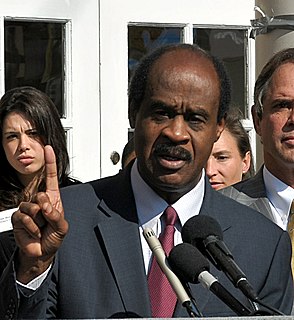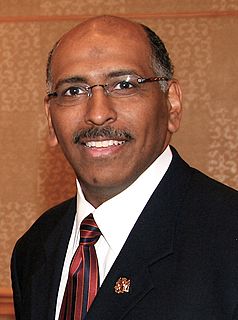
The governor of the State of Maryland heads the executive branch of the government of the State of Maryland, and is the commander-in-chief of the state's National Guard units. The governor is the highest-ranking official in the state and has a broad range of appointive powers in both the state and local governments, as specified by the Maryland Constitution. Because of the extent of these constitutional powers, the governor of Maryland has been ranked as being among the most powerful governors in the United States.
Janet S. Owens is an American politician and Democrat who served as County Executive of Anne Arundel County, Maryland, for two terms, from 1998 until 2007. She is a resident of Millersville, Maryland. She was the first female county executive of Anne Arundel County. As County Executive, she was seen as a moderate, frequently implementing more conservative policies than the County Council, which is now led by Republicans. After conducting polling regarding her chances of being re-elected to her former position of County Executive, Owens decided against running for the Democratic nomination in June 2010.
The following is a list of elections for the position of Governor of Maryland since the American Civil War.

The Maryland gubernatorial election of 2006 was held on November 7, 2006. Incumbent Republican Governor Bob Ehrlich ran for a second term, but was defeated by the Democratic nominee, Baltimore Mayor Martin O'Malley. Ehrlich was the only incumbent governor from either party to lose a general election in the 2006 midterms.

United States gubernatorial elections were held on November 5, 2002 in 36 states and two territories. The Republicans won eight seats previously held by the Democrats, as well as the seat previously held by Minnesota governor Jesse Ventura, who was elected on the Reform Party ticket but had since renounced his party affiliation. The Democrats won 10 seats previously held by the Republicans, as well as the seat previously held by Maine governor Angus King, an independent. Overall, the Republicans suffered a net loss of one seat while the Democrats made a net gain of three. The Republicans managed to maintain their majority of state governorships, but it was reduced to a margin of only two seats. The elections were notable for the sheer number of state governorships that changed parties – 20 in total, constituting more than half of the seats up for election. Additionally, a number of Democratic and Republican gains occurred in states that typically favor the other party; for instance, Republican candidates won the usually Democratic states of Maryland, Hawaii, Minnesota and Vermont, while Democratic governors were elected in Republican-leaning states like Wyoming, Tennessee, Oklahoma and Kansas.

Isiah "Ike" Leggett is an American politician from the U.S. state of Maryland and former executive of Montgomery County, Maryland. He is a member of the Democratic Party.
Robert L. Flanagan was the Secretary of the Maryland Department of Transportation from 2003 until 2007, under the administration of Governor Robert Ehrlich. Prior and subsequent to this position, Flanagan served in the Maryland House of Delegates. He was first elected to office in 1987 and served with fellow Republican, Robert Kittleman, until 2002, when the districts were redrawn and he would move to District 14B.

The Maryland gubernatorial election of 2010 was held on November 2, 2010. The date included the election of the Governor, Lieutenant Governor, and all members of the Maryland General Assembly. Incumbent Governor Martin O'Malley and Lieutenant Governor Anthony G. Brown, both Democrats, were eligible to run for a second term in office and won re-election against former governor Bob Ehrlich and his running mate Mary Kane. Ehrlich had previously been defeated for reelection by O'Malley in 2006. O'Malley and Brown became the first gubernatorial ticket in Maryland history to receive more than one million votes.As of 2019, this is the most recent election in which a Democrat was elected Governor of Maryland.

Kenneth "Ken" Ulman is an American attorney, founder and CEO of a consulting firm, Margrave Strategies, and former Democratic politician in Howard County, Maryland. Prior to working in the private sector, Ulman served as county executive for Howard County from 2006 to 2014. He also represented the 4th district as a County Council member from 2002 to 2006. Ulman previously worked in the office of Maryland Governor Parris Glendening as liaison to the Board of Public Works and secretary to the Cabinet.

The Pennsylvania Gubernatorial election of 1990 was held on November 6, 1990. Incumbent Democratic Robert P. Casey easily defeated Republican Barbara Hafer. Governor Casey defeated Ms. Hafer by a margin of 35.29%, and carried 66 out of 67 Pennsylvania counties.

The Pennsylvania gubernatorial election of 1978 was held on November 7, 1978 between Republican Dick Thornburgh and Democrat Pete Flaherty.

The 2014 Maryland gubernatorial election took place on November 4, 2014, to elect the Governor and Lieutenant Governor of Maryland. Incumbent Democratic Governor Martin O'Malley was term-limited and could not run for reelection to a third consecutive term.

The Maryland gubernatorial election of 1998 was held on November 3, 1998. Incumbent Democratic Governor Parris Glendening sought re-election. Governor Glendening emerged victorious from the Democratic primary after defeating several candidates. Former State Delegate Ellen Sauerbrey, who was the 1994 Republican nominee for governor, ran again for governor and won her party's nomination. The election between Glendening and Sauerbrey four years prior was extremely contentious, and ended with the Sauerbrey campaign challenging the results. Ultimately, despite the controversial nature of the previous election, Governor Glendening comfortably beat back Sauerbrey's spirited challenge, winning his second and final term as governor.

The Maryland gubernatorial election of 1994 was held on November 8, 1994. Incumbent Democratic Governor William Donald Schaefer was ineligible for re-election. Prince George's County Executive Parris Glendening emerged victorious from the Democratic primary after defeating several candidates. Former State Delegate Ellen Sauerbrey, who would also be the 1998 Republican nominee for Governor, won her party's nomination. The election between Glendening and Sauerbrey was extremely contentious; the Sauerbrey campaign challenged the results. Ultimately, Glendening prevailed over Sauerbrey.

The Maryland gubernatorial election of 2018 was held on November 6, 2018. The date included the election of the Governor, Lieutenant Governor, and all members of the Maryland General Assembly. Incumbent governor Larry Hogan and Lieutenant Governor Boyd Rutherford, both Republicans, were eligible to run for a second term in office and pursued a successful re-election against former NAACP CEO Ben Jealous and his running mate Susan Turnbull. Hogan and Rutherford became the first Republican gubernatorial ticket in Maryland to win reelection since 1954, and won the greatest ever number of votes for a gubernatorial candidate in Maryland.






















